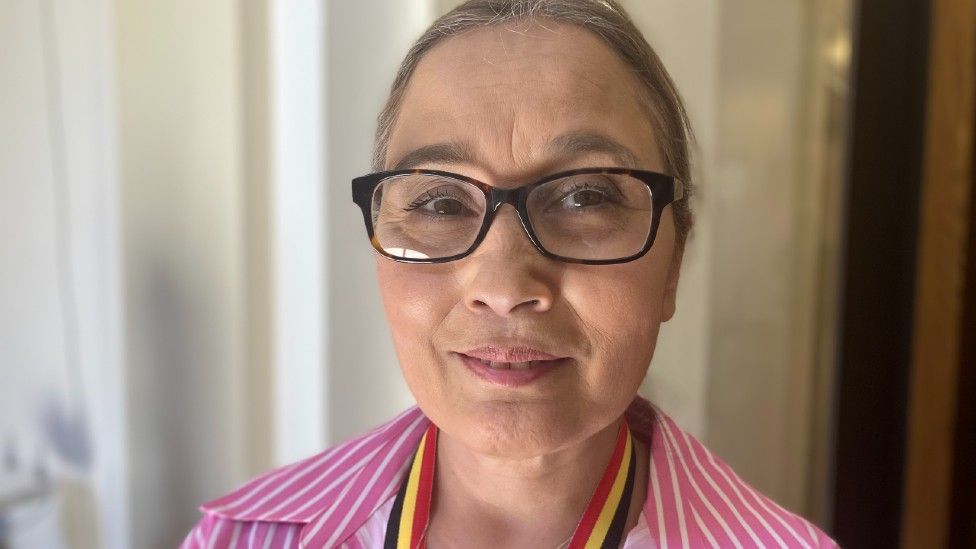Man says infected blood scandal 'destroyed everything I knew'
- Published

Maria Fletcher blames her diabetes and pancreatitis on hepatitis, which she says she contracted from infected blood
Families from Leicestershire have reacted to the results of a damning inquiry into the use of infected blood by the UK authorities.
The investigation has accused doctors, the government and NHS of letting patients catch HIV and hepatitis.
More than 30,000 children and adults who needed transfusions or blood products were given tainted supplies from 1970 to 1991.
Maria Fletcher, who got hepatitis, said: "They took my youth away."
Mick Mason said his diagnosis meant he had to give up on many future plans
The inquiry found blood from high-risk groups, such as prisoners and drug users, was inadequately screened and treated.
While many were infected during standard transfusions, a large number were affected when given Factor VIII, a blood-derived protein used to treat haemophilia.
About 3,000 have since died, and thousands more are living with severe health problems.
Mick Mason, 57, from Ashby-de-la-Zouch in Leicestershire, was infected with hepatitis C and HIV in the 1980s.
More recently, he was told he was given Factor VIII from a man who went on to die from CJD - the human variant of mad cow disease.
Suresh Vaghala gave evidence to the inquiry about the harm the scandal had caused
He said: "When I found out it destroyed everything I knew, my whole life changed.
"From that point, I knew I would never have been able to have children, have a family. I couldn't get a mortgage or life insurance, I didn't get the career I wanted.
"Every time I went to the hospital, they told me I might have six months to live because there was no treatment back then."
He added: "Successive governments have covered it up.
"No-one wanted to admit it was all down to finances; it was about money, it wasn't putting patients first, it wasn't putting haemophiliacs first."
Suresh Vaghala's brother, Praful, was also infected and died of AIDS in 1995
Those affected have welcomed the report, but are still counting the cost.
Suresh Vaghala, from Bushby in Leicestershire, and his brother Praful were infected with HIV and hepatitis from Factor VIII transfusions in the 1970s.
Praful died from AIDS in 1995, aged 33.
Sarah Adams said her father's HIV diagnosis meant they were ostracised by their community
Mr Vaghala, 60, who gave evidence to the inquiry, said: "I've lost a lot of friends. When you go to 70 funerals in one year, you think to yourself, 'I'm going to be one of these'.
"I certainly didn't think I was going to see this day, ever, so this is like a dream come true.
"We have waited so long, and we have worked so hard - it is 40 years of hard campaigning that have brought us to this point.
"Many of us didn't think this day would actually come, in our head it was fictitious, and we would never be alive to see this day.
"We are overwhelmed and overjoyed that what we have seen today meets all our needs and ticks all the boxes we had - and some we didn't know existed."
Sarah Adams said she had campaigned for years on behalf of her father
Sarah Adams, 43, who now lives in Birstall, said her father, Alan Burgess, 66, was infected with HIV and hepatitis from Factor VIII.
She said the diagnosis meant the family were ridiculed in their Suffolk community, and she was bullied in school.
"This has been a long time coming," she said. "We have been fighting, as everyone knows, for decades.
"I read one sentence, 'this disaster was not an accident', and that is all that needed to be said to me.
"We have always known this disaster was not an accident; we have always known there are people who are culpable.
"The blood services, the NHS, doctors, the government, just sweeping it under the carpet, year-in, year-out."
'Took youth away'
Maria Fletcher, 55, from Blaby, has a blood disorder that requires regular transfusions.
But she contracted hepatitis C in the 1980s, aged 21, and, though now clear of this, blames the damage it did for causing her diabetes and pancreatitis.
She said the government's apology was a crucial step.
"It's very important," she said. "That's the key thing, the government needs to give a sincere apology.
"Now they understand what we went through - hopefully - so the denials, the lies and everything, that has to stop now.
"They took my youth away at a very young age, they stopped me from doing what everybody was doing.
"It shouldn't be allowed, what they have done."
Follow BBC Leicester on Facebook, external, on X, external, or on Instagram, external. Send your story ideas to eastmidsnews@bbc.co.uk, external or via WhatsApp, external on 0808 100 2210.
- Published20 May